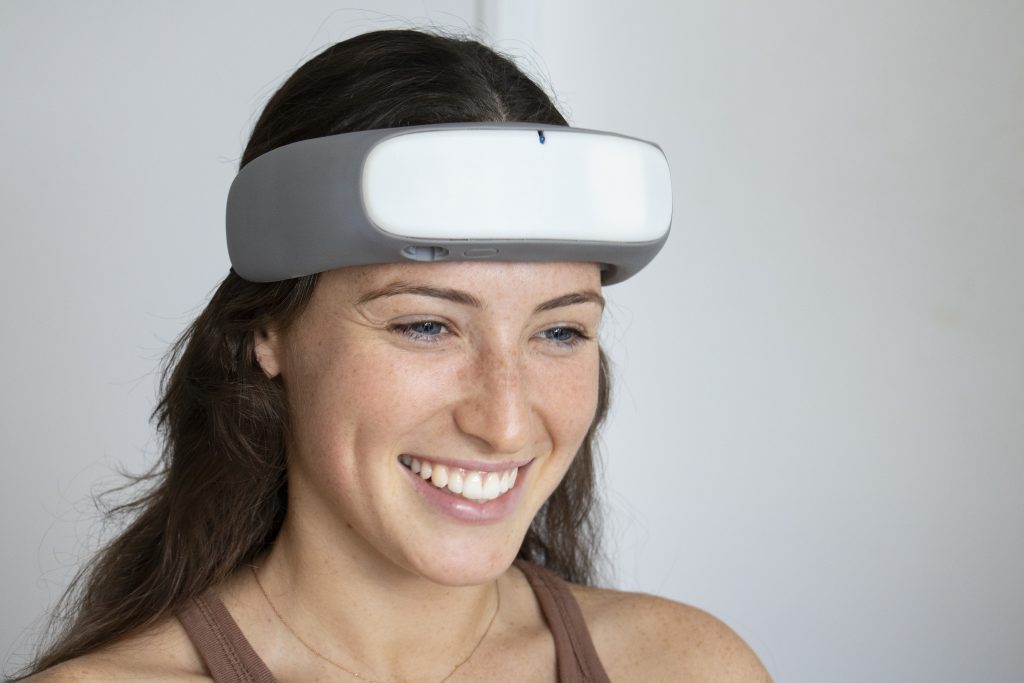Head into the future
Neurode founders Damian Sofrevski and Nathalie Gouailhardou have built an inexpensive headset that can deliver drug-free, personalised treatment to people with ADHD.
Picture someone wearing a wireless headset. As they play games on their phone or computer – games specially designed for them – the headset monitors what’s going on inside their brain and carefully delivers bespoke, targeted electronic pulses to address whatever they are struggling with. It could be ADHD, depression, age-related decline, or cognitive challenges.
This futuristic invention now exists in pilot form and is being tested and prepared for commercialisation by the Australian founders of Neurode, Damian Sofrevski and Nathalie Gouailhardou. In 2021 the pair completed NSW Health’s free Commercialisation Training Program, run by Cicada Innovations, to help them bring their exciting new technology to market. They found the program really insightful and with some of the most helpful topics being those on regulatory environment, business models and reimbursement.

Focusing on the end user
From the start, Damian, an engineer and physicist, and Nathalie, a neuroscientist, shared a vision for what their Neurode device should achieve. “Damian’s passionate about accessibility in tech, so to him the question is how we make it affordable,” Nathalie says. “I’m all about the patient outcomes, and how do we improve quality of life. So we’re both thinking about the end user in different ways.”
In a previous job, Nathalie worked with functional near-infrared spectroscopy (fNIRS) machines the size of a fridge and costing $250,000, which monitored brains and predicted treatment outcomes of surgical implants. She loved the technology but wanted many people to be able to access it. “So I called Damian, because he was the best engineer and physicist I knew, and I asked, ‘Is it possible to make this smaller and more affordable?’”
Already the start-up has proven the device is comparable to equivalent machines used for research, and full trials are being planned for adults with ADHD in 2023.
Planning for tomorrow, not today
The duo say they’ve learned many things on their start-up journey so far. “Medical device start-ups sit in a different silo to other start-ups,” Damian says. “Unlike in some other areas, you can’t just release something quickly and adapt it and modify it as you go.”
“Our product is going to go to market in a couple of years, so we need to make sure we’re building something to add significant value to that world,” Nathalie says. “We have to build for what health care looks like in five years, not for what it looks like today.”
Building bespoke validation tools along the way takes up more time and energy than they expected. “You have to design equipment to test your equipment – it can’t be an afterthought,” Damian says. “We knew we had to do it but didn’t realise how much effort it took.”
ADHD is the initial application for Neurode’s platform technology. “The ADHD problem is really big,” Nathalie says. In Australia alone, there is reported to be more than a million people with diagnosable ADHD, a rapidly growing number of whom are adults, particularly women. An estimated 30 per cent of those will be resistant to drug treatment, and a larger group will be drug averse, needing science-based alternative therapies. “I have ADHD, so I feel connected to the community and can relate to the problems they face,” she says. “I know it doesn’t have to be quite this hard. Our technology is a really perfect condition for this type of treatment. But there are a lot of disorders that this could be helpful for. We’re hoping this could be helpful for depression and age-related cognitive decline.”
Nathalie says she’s already receiving heart-warming feedback from people with ADHD who are excited about the product’s potential. “People write emails saying, ‘I have hope for the first time – this is going to change my life for the better’.”
Updated 2 years ago